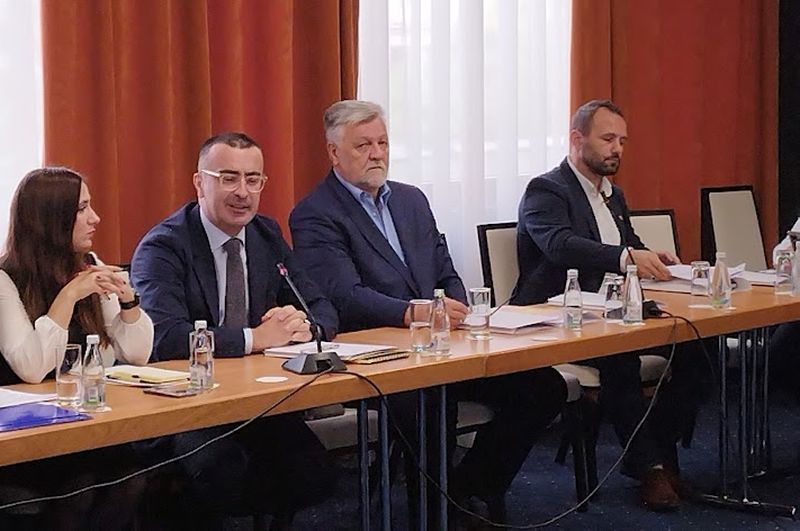
State coordinator for public administration reform Dragan Ćuzulan participated in a round table entitled “Transparency of the decision-making process in BiH” organized by Transparency International BiH, where he presented data from the results of research on the fulfillment of standards on proactive transparency among the state institutions of Bosnia and Herzegovina.
Ćuzulan mentioned that out of a total of 80 state institutions of Bosnia and Herzegovina, 65 of them responded to the questionnaire on the fulfillment of proactive transparency standards, classified into seven categories: financial, organizational, strategic and operational information, public procurement, public consultation and freedom of access to information.
“The average fulfillment of proactive transparency standards in state institutions in 2023 is 72.27 percent, which represents a slight improvement compared to 2022, when fulfillment was 68.23 percent. Citizens want to know where their money is spent and what the institutions in which the budget money is invested are doing,” noted the state coordinator for public administration reform. He underlined that in the first surveys, four institutions met 100 percent of all standards, namely the Public Administration Reform Coordinator’s Office (PARCO), the Directorate for European Integration (DEI), the Agency for the Development of Higher Education and Quality Assurance (HEA) and the Agency of Statistics in BiH, and in 2023 the Agency for Police Support and the Agency for Gender Equality joined them.
“These last two agencies have recently shown an additional step forward and I would say they made a better result. The biggest step forward in the publication of information compared to last year was made by: the Agency for the Protection of Personal Data, which raised the openness of data from 76 to 92 percent, the Ministry of Human Rights and Refugees of BiH from 78 to 97 percent, the Agency for Public Procurement of BiH from 76 to 92 percent, the Central Harmonization Unit of the Ministry of Finance and Treasury of BiH from 63 to 86 percent, the Center for Information and Recognition of Documents in the Field of Higher Education from 73 to 84 percent. We would also point out the Directorate for Economic Planning from 65 to 78 percent,” said Ćuzulan.
He mentioned that there are also bad examples among state institutions in research.
“A number of institutions simply do not respond to these questionnaires, although there is an obligation in the decision of the BiH Council of Ministers to respond to the questionnaires that we send. For example, a small number of institutions, four of them do not have published laws or decisions on establishment, 27 do not have published regulations on internal organization, 50 institutions have published their integrity plans, while 14 institutions have not published an action plan to fight corruption, etc. Also, 18 institutions do not have tenders and advertisements published on their website. 23 institutions do not publish documents for public consultations, while 35 institutions do not publish statements about published consultations, which are summaries, ie comments on the publication of consultations. This year, 24 institutions announced the salaries of employees, which is also a very low level and something that must be improved in the coming period”, explained Ćuzulan.
Chairman of the Board of Directors of Transparency International BiH, Srđan Blagovčanin, mentioned that there are shortcomings when it comes to proactive transparency in the decision-making process.
“It should not be emphasized how important proactive transparency is for strengthening political responsibility at all levels in Bosnia and Herzegovina, but also for enabling citizen participation in the decision-making process. What we specifically noted and registered as disputed or deficient relates to the publication of data and reports on the work of institutions, but also on decision-making and law-making processes,” said Blagovčanin.
Blagovčanin mentioned the example of the law on the HJPC, stating that the public has no insight into the text in which it was adopted.
“That practice must be changed. I think the moment in which today’s event takes place is important, when the process of adopting the new Law on Freedom of Access to Information (FOIA) is current. For our part, we are not satisfied with the proposed solutions contained in that law. Our position is that there are no adequate protection mechanisms for access to information, especially in terms of ensuring secondary protection of the right to access information. We think that the proposed solution in which the Appeals Council, the second-instance body is presented, is not satisfactory. We think that there should be a specialized body, which has both the capacity and the professional knowledge, to apply the law in such a way. Today’s gathering will perhaps also be a message that it is necessary to refine the solutions in the proposal of this law”, said Blagovčanin.
